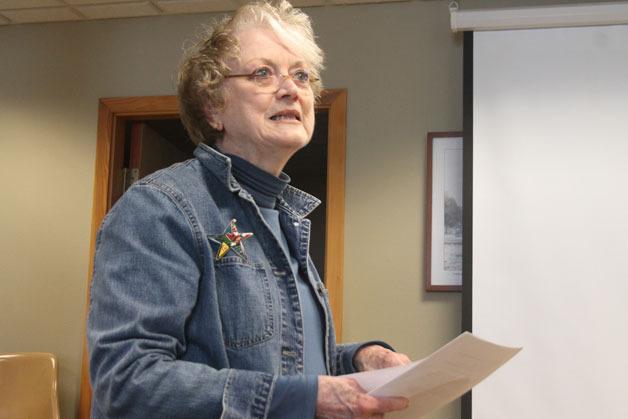Facing questions and pressure from four members of the disbanded Langley Ethics Commission, the city council agreed Monday night to take another look at its ethics code and ethics training.
Ann Medlock spearheaded the effort to get the Langley City Council to reconsider its decision to remove a standing ethics board.
“The commission voted to have one, it was in the code,” Medlock said in a phone interview before the city council meeting. “It was a tight argument, pros and cons.”
“Given Langley’s history, the votes prevailed that we needed an ethics board,” she added.
Earlier in March, the city council approved the amended ethics policy that struck an ethics board from the process, opting instead to handle an ethical concerns within City Hall or, if necessary, assembling an ad-hoc committee to review issues outside the city government.
Having the ethics board be part of the city structure was a sticking point for the original ethics commission. In the commission’s letter dated Jan. 29 to Mayor Fred McCarthy, the four commission members wrote, “moving the board into Langley’s governmental structure makes it, we concluded, not worth doing. Its independence would be compromised and, in situations such as those that have arisen in the past, it would be of no use.”
The Langley City Council agreed to hold a workshop with the remaining ethics commission members early next month after discussing its concerns with the formation of a standing ethics board. Councilman Jim Sundberg said he worried about confidentiality if the ethics board’s meetings were public, which could put a whistleblower in an uncomfortable position. There were also questions about the ethics board’s authority or possible judiciary functions, which were addressed by ethics commission member Ursula Roosen-Runge.
“I think it is a challenge,” Roosen-Runge said. “It’s not impossible.”
“If it got to the level of being criminal, we would refer it,” she later added.
Finding members to fill a board that did not meet regularly was also a concern. Several Langley committees have vacant positions that have been difficult to fill.
“Our concern was that it’d be hard to find people to join a board that doesn’t do anything,” said Councilman Bruce Allen. “They’d be bored to death.”
Medlock, who read a three-page statement to the council about its need to reconsider the formation of a standing board, outlined the commission’s vision for the group. She said the ethics board would be advisory by giving the mayor and city council an opinion on ethics issues, train city staff and elected city officials, meet “only when needed,” and would be available to explain the ethics policy.
McCarthy, the city council and the four ethics commission members tentatively agreed to a 10 a.m. to noon Wednesday, April 9 workshop on the ethics policy.



